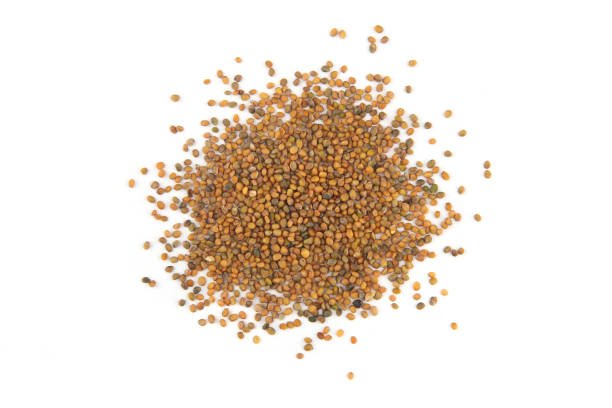Arugula Seeds:
Description: Arugula seeds come from the arugula plant, also known as rocket or rucola. The seeds are small, round, and dark brown to black in color. Arugula is a leafy green plant often used in salads and culinary dishes due to its peppery, mustard-like taste. The seeds are used to grow the arugula plant, which is known for its high nutritional content.
Shape: The seeds are small, oval, and flat with slightly rough edges.
Size: Approximately 2 to 3 mm in diameter.
Color: Dark brown to black.
Texture: Smooth and hard, with a slight roughness when viewed under magnification.
Weight: Each seed weighs very little (around 0.01 to 0.02 grams).
Odor: Arugula seeds typically have a mild, nutty aroma when fresh, but the scent is not overpowering.
Nutrient Composition: Arugula seeds contain essential oils, proteins, and carbohydrates.
Fatty Acids: Rich in unsaturated fatty acids, such as linoleic acid (omega-6) and oleic acid (omega-9), which are beneficial for heart health.
Glucosinolates: Contains glucosinolates, compounds that may have anti-cancer and detoxification properties.
Proteins and Amino Acids: High-quality proteins, which are important for muscle repair and growth.
Minerals: A source of important minerals like calcium, iron, and magnesium.
Vitamins: High in Vitamin C, Vitamin A, and Vitamin K.
Arugula seeds provide several important nutrients:
Protein: Contains about 20-30% protein by weight.
Fats: Contains essential fatty acids, including omega-6 and omega-9 fatty acids.
Carbohydrates: Arugula seeds contain simple carbohydrates that provide energy.
Fiber: High in dietary fiber, which aids in digestion.
Vitamins: Good source of Vitamin C, A, K, and some B-vitamins
Minerals: Rich in calcium, iron, magnesium, and potassium.
Calories: Approximately 300-400 calories per 100 grams.
Quality Standards for Arugula Seed
“Compliant with local and European standards according to food safety regulations.”
Purity: Seeds must be free from contaminants, including pesticides, chemicals, or foreign materials (e.g., stones or other seeds).
Size and Shape: Uniform size and shape, with no deformities or irregularities.
Moisture Content: Moisture content should not exceed 8-10% to avoid mold and spoilage.
Color: The seeds should be dark brown or black, indicating they are mature and of high quality.
Odor: Mild, fresh, and nutty scent; should not have any rancid or musty odors.
Packaging: Should be in air-tight, moisture-proof packaging to prevent contamination.
Purity of Germination: Seeds should have a high germination rate, ideally over 90%.
Microbiological Standards:
Total Plate Count (TPC): The total microbial load in arugula seeds should be below 1,000,000 CFU/g.
Yeast and Molds: Arugula seeds should have low levels of yeast and molds, ideally below 100 CFU/g.
E. coli: There should be zero tolerance for E. coli contamination
Salmonella: Zero tolerance for Salmonella in arugula seeds, as this pathogen can cause foodborne illnesses.
Coliforms: Should be below 10 CFU/g.
Aflatoxins: Aflatoxin levels should not exceed 4 ppb.
Staphylococcus aureus: Should be under 100 CFU/g.
Packaging and Storage :
As per the customer’s request, polypropylene bags and cartons.”.
Storage: Store in a cool, dry, and dark environment, ideally at temperatures between 15-20°C. Keep them away from direct sunlight and humidity to preserve seed quality.
Shelf Life: When stored properly, arugula seeds can last for 1-2 years without significant degradation.
. Shelf Life :
The shelf life of arugula seeds is approximately 1-2 years, depending on storage conditions. Proper storage in cool, dry, and dark conditions helps extend their shelf life and preserves their nutritional quality.
Traceability and Compliance;
Origin :Egypt
Application:
Arugula seeds are often used to grow arugula greens, which are consumed in salads, sandwiches, and garnishes due to their peppery flavor
.Arugula seeds are used in various health supplements for their high nutritional content, including vitamins, minerals, and antioxidants.
Arugula seeds contain oils that can be extracted for culinary or cosmetic purposes, though it is not as widely extracted as other seed oils.
In some cultures, arugula seeds are used in water purification processes due to their ability to remove impurities.
Traditional Medicine: Arugula seeds have been used in traditional medicine for digestive issues, as an anti-inflammatory agent, and for their potential cancer-preventing properties due to their glucosinolate content.
Contact information:


